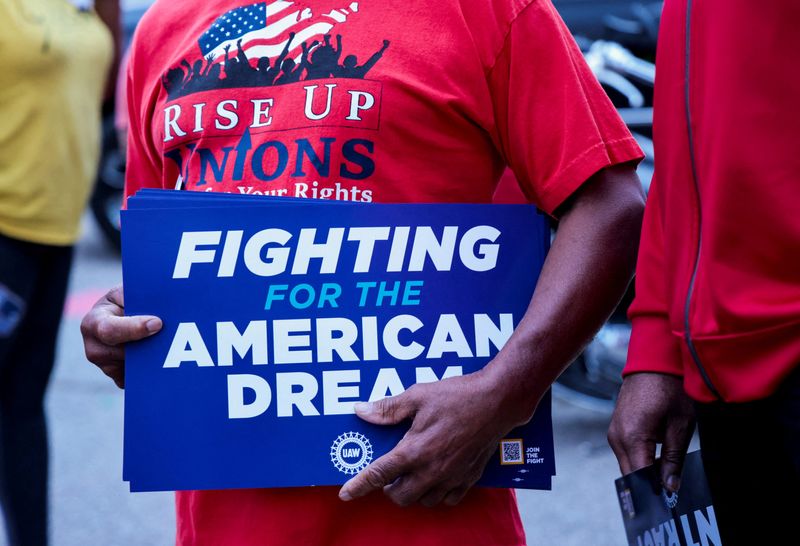What people are saying about the US auto worker strike
2023.09.15 02:12

© Reuters. FILE PHOTO: A United Auto Workers union member holds a sign outside Stellantis Sterling Heights Assembly Plant, to mark the beginning of contract negotiations in Sterling Heights, Michigan, U.S. July 12, 2023. REUTERS/Rebecca Cook/File Photo
2/3
(Reuters) – The United Auto Workers union launched simultaneous strikes at three factories owned by General Motors (NYSE:), Ford (NYSE:) and Chrysler parent Stellantis (NYSE:) on Friday, kicking off the most ambitious U.S. industrial labor action in decades.
The walkouts will halt production of the Ford Bronco, Jeep Wrangler and Chevrolet Colorado pickup truck, along with other popular models.
Here is what people are saying about the unprecedented walkouts:
DAN IVES, ANALYST AT WEDBUSH:
“If the strike lasts longer than three to four weeks, it will be moderately detrimental to GM and Ford’s EV strategy in 2024…While the Detroit stalwarts battle with the UAW, there’s a bottle of champagne that’s being iced at Tesla (NASDAQ:) headquarters.”
SAM FIORANI, PRODUCTION FORECASTER AT AUTO FORECAST SOLUTIONS:
“This is more of a symbolic strike than an actual damaging one … If the negotiations don’t go in a direction that (UAW President Shawn) Fain thinks is positive, we can fully expect a larger strike coming in a week or two.”
LEE JAE-IL, ANALYST AT EUGENE INVESTMENT & SECURITIES:
“For South Korean automakers, the UAW strike could help raise their car prices in the United States due to production cuts, and that could create a seller’s market environment. Also, it could potentially help increase its car exports to the United States. However, production disruptions at parts suppliers that supply to GM would be inevitable.”
ARTHUR WHEATON, DIRECTOR OF LABOR STUDIES AT CORNELL SCHOOL OF INDUSTRIAL AND LABOR RELATIONS:
“It’s not a devastating hit to the communities. It’s not a devastating hit for the strike fund. It’s not a devastating hit on the balance sheet for any of the automakers but it starts to raise the stakes, which was the intent.
“I think they are making progress at the table… the initial (automaker) offers were much lower, like 9% (wage) increases and now you’re up to 20% for increases. So that’s more than double. You’re seeing the UAW come down. You’re no longer hearing anything about the 32-hour work week from the UAW.”
STELLANTIS:
“We are extremely disappointed by the UAW leadership’s refusal to engage in a responsible manner to reach a fair agreement in the best interest of our employees, their families and our customers. We immediately put the Company in contingency mode and will take all the appropriate structural decisions to protect our North American operations and the Company.”
DEMOCRATIC U.S. REPRESENTATIVE ELISSA SLOTKIN OF MICHIGAN:
“I’m looking forward to joining our auto workers on the picket line this weekend. For the sake of Michigan’s economy and our working families, I hope this strike is short-lived … I hope the UAW and the Big Three continue to negotiate in good faith to reach a fair agreement as quickly as possible.”
JAY TIMMONS, NATIONAL ASSOCIATION OF MANUFACTURERS PRESIDENT:
“The impact of this strike will echo far beyond the city of Detroit as multiple economic analyses have demonstrated. The small and medium-sized manufacturers across the country that make up the automotive sector’s integrated supply chain will feel the brunt of this work stoppage, whether they are a union shop or not.”








